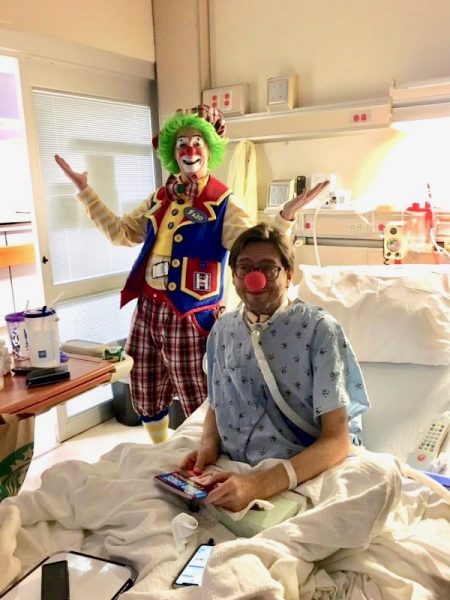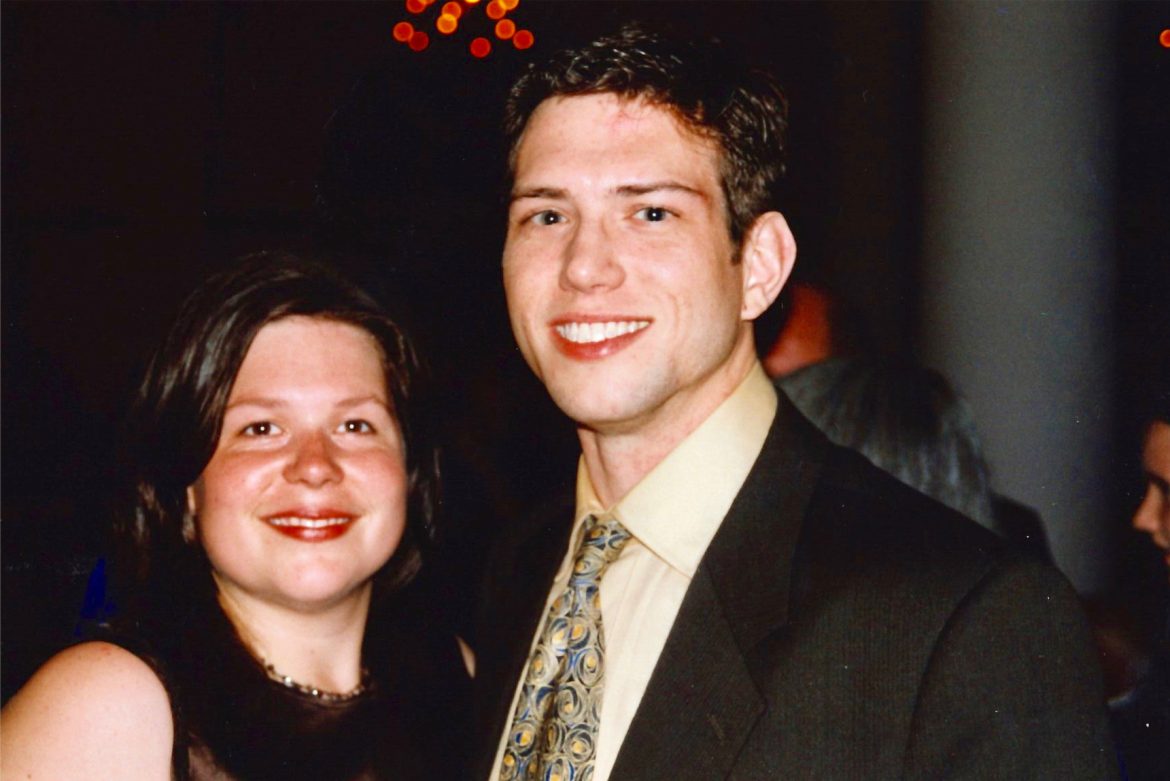Digital Junior Copy Editor Riley Ramsey’s uncle Rusty Ramsey (right) stands with his wife, Lisa Herriott (left), at a wedding in 1998. Though Rusty suffered from Cystic Fibrosis, a genetic disorder, from birth, his condition worsened towards the end of his life when Riley knew him. “After he died, the picture I had of him in my mind did everything but fade. It flourished, it grew, fed by the stories I heard. I saw all the people touched by Rusty during his life and were torn apart by his death. Story after story was told to me, photo after photo was shown, and finally, I began to feel like I really knew him,” Riley wrote. Photo courtesy of Lisa Herriott
Digital Junior Copy Editor Riley Ramsey describes how her relationship with her uncle was impacted by his genetic disorder, Cystic Fibrosis.
In some languages, there are two words for “know.”
One is for knowing information. Being aware of someone or something.
The other is knowing a person or thing personally. A place you have lived or someone with whom you have spoken face-to-face. Someone of whom you could say, “Oh yeah, I know them,” and mean it when their name is casually dropped in a conversation.
For the first 12 years of my life, I would say my relationship with Rusty Ramsey was little more than the first kind of ‘know.’ I’d met him a few times, but I was young and the visits were brief.
I knew him as my dad’s brother. I knew him as the person whose name would pop up in conversation every so often.
I knew him as the only person in my life with Cystic Fibrosis.
But I didn’t really know him.

Digital Junior Copy Editor Riley Ramsey’s uncle Rusty Ramsey (right) sits at the University of Alabama at Birmingham Hospital on April 25, 2019. Rusty spent nine months in the hospital for an organ transplant because of his genetic disorder, Cystic Fibrosis. “(While) waiting impatiently with the rest of my family, hour after hour for a set of organs it seemed would never come, I finally began to learn more and more about my uncle. I saw his personality. I got to know his sense of humor. But it was all overshadowed by pain and illness. For all the hours I spent sitting beside his bed, I never got to know Rusty for who he really was,” Riley wrote. Photo courtesy of Randy Ramsey
The Centers for Disease Control defines CF as “a genetic disorder that causes problems with breathing and digestion.” That’s a simple definition that fails to show how much CF can affect one’s life.
Before the 1980s, less than half of CF patients lived into their 20s, according to Medical News Today. When my uncle was diagnosed in 1974, the doctors told him he would only make it to 16.
So when he reached 50 in 2018, there was only one option left: an organ transplant. And it wasn’t just one organ, it was three – the lungs, the liver and a kidney.
In January of 2019, he was checked into the University of Alabama at Birmingham Hospital, which was 2,473 miles closer to me than where he lived in Seattle, Washington.
I suddenly went from seeing him once every few years to once a week. We made the three-and-a-half-hour drive to Birmingham to visit him in the hospital almost every weekend for months.
I began to get to know the city. To this day, I could show you the way to the hospital gift shop. I could tell you what time to hit the little Starbucks in the corner on the second floor. I could walk you through the nearby parks and to the best restaurants downtown.
However, Birmingham wasn’t the only thing I got to know.
It wasn’t just that my aunt, Lisa Herriott, and my uncle had lived across the country, Rusty’s disease made it hard for him to travel. So while sitting in one of the chairs in the cramped gray hospital room waiting impatiently with the rest of my family hour after hour for a set of organs it seemed would never come, I finally began to learn more and more about my uncle.
A video shows moments of Digital Junior Copy Editor Riley Ramsey’s uncle Rusty Ramsey throughout his life. Though Rusty was told he wouldn’t live to 16, he ended up living past 50 and despite his genetic disorder, Cystic Fibrosis, he had a full life surrounded by people he loved. “I had previously created a photo slideshow for his memorial, but I (had always) wanted to edit something together using video. There’s something about this video that helps me grieve, especially when combined with the music,” Rusty’s brother Randy Ramsey said. Video by Randy Ramsey
I saw his personality. I got to know his sense of humor. But it was all overshadowed by pain and illness.
For all the hours I spent sitting beside his bed, I never got to know Rusty for who he really was.
When we got the call in July that after seven months of waiting, they had finally found a suitable donor, we drove nineteen hours from New England where we were on vacation, giddy and full of hope.
Two months later we got a very different kind of call.
Rusty died on Sept. 13, 2019.
While sitting in one of the chairs in the cramped gray hospital room waiting impatiently with the rest of my family hour after hour for a set of organs it seemed would never come, I finally began to learn more and more about my uncle.
After he died, the picture I had of him in my mind did everything but fade. It flourished and grew, fed by the stories I heard. I saw all the people touched by Rusty during his life and torn apart by his death. Story after story was told to me, photo after photo was shown, and finally, I began to feel like I really knew him.
He became an inspiration for me, a role model, someone to guide me in my life.
I’ll never know him like my dad does, like my grandparents, like my aunt, but I’m grateful for the time I got to spend with him and the glimpse I was given of who he was.
I learned that really knowing someone is never two-dimensional because people are never two-dimensional. There are many parts to knowing someone and there’s no set path to get there. How you get to know someone doesn’t matter, what’s important is the end result.
